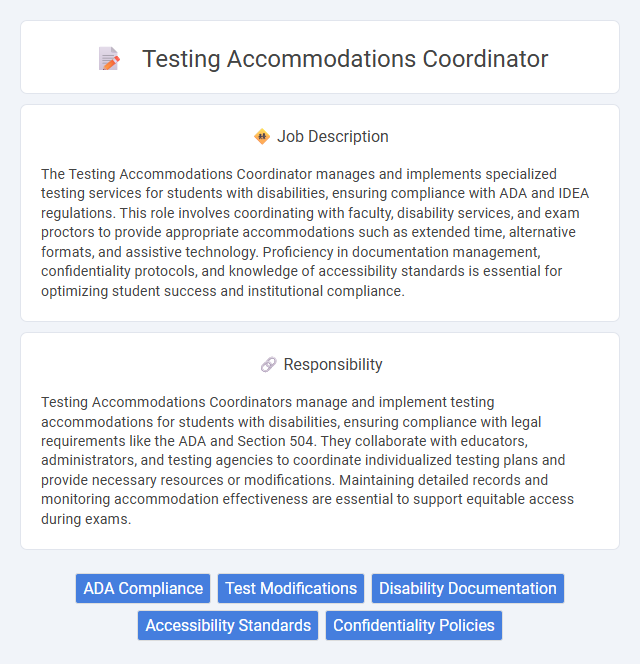
The Testing Accommodations Coordinator manages and implements specialized testing services for students with disabilities, ensuring compliance with ADA and IDEA regulations. This role involves coordinating with faculty, disability services, and exam proctors to provide appropriate accommodations such as extended time, alternative formats, and assistive technology. Proficiency in documentation management, confidentiality protocols, and knowledge of accessibility standards is essential for optimizing student success and institutional compliance.
Individuals with strong organizational skills and attention to detail are likely suitable for the Testing Accommodations Coordinator role, as it requires managing diverse testing needs and ensuring compliance with policies. Those who demonstrate empathy and a patient demeanor may better handle communication with students requiring accommodations, improving overall effectiveness. Candidates who struggle with multitasking or maintaining confidentiality might find the demands of this position challenging.
Qualification
A Testing Accommodations Coordinator must possess in-depth knowledge of standardized testing protocols and accessibility laws such as the ADA and IDEA. Strong organizational skills and experience with managing confidential student data are essential to ensure compliance and effective accommodations. Proficiency in collaborating with educational staff, students, and external agencies is critical to facilitate seamless testing environments tailored to diverse learner needs.
Responsibility
Testing Accommodations Coordinators manage and implement testing accommodations for students with disabilities, ensuring compliance with legal requirements like the ADA and Section 504. They collaborate with educators, administrators, and testing agencies to coordinate individualized testing plans and provide necessary resources or modifications. Maintaining detailed records and monitoring accommodation effectiveness are essential to support equitable access during exams.
Benefit
A Testing Accommodations Coordinator likely enhances accessibility and fairness in exam settings by ensuring students with disabilities receive appropriate support. This role may improve compliance with legal standards such as the ADA, reducing institutional risk. Coordination efforts probably increase overall student success rates and satisfaction by fostering equitable testing environments.
Challenge
The Testing Accommodations Coordinator role likely involves navigating complex regulatory requirements and ensuring compliance with educational standards. Challenges may arise in balancing the diverse needs of students while maintaining standardized testing integrity. Managing communication between students, educators, and administrators often requires diplomatic problem-solving and adaptability.
Career Advancement
The Testing Accommodations Coordinator plays a pivotal role in ensuring equitable assessment environments for students with disabilities by managing accommodations and compliance with legal standards like the ADA and Section 504. Expertise in educational policies and accessibility tools enhances qualifications, enabling progression to leadership roles such as Disability Services Director or Educational Compliance Manager. Developing skills in data analysis, collaboration with cross-functional teams, and project management fosters career advancement within educational institutions or corporate training departments.
Key Terms
ADA Compliance
A Testing Accommodations Coordinator ensures compliance with the Americans with Disabilities Act (ADA) by implementing appropriate testing modifications for students with disabilities. This role involves collaborating with disability services, verifying documentation, and coordinating tailored accommodations such as extended time, alternative formats, and assistive technology during exams. Maintaining detailed records and training staff on ADA standards are critical to upholding equitable testing environments.
Test Modifications
A Testing Accommodations Coordinator specializes in managing and implementing test modifications to ensure equitable assessment conditions for students with disabilities. This role involves coordinating adjustments such as extended time, alternative test formats, and adaptive technology according to individual education plans (IEPs) or 504 plans. Expertise in compliance with the Americans with Disabilities Act (ADA) and state testing regulations is essential to optimize accessibility and maintain test integrity.
Disability Documentation
Testing Accommodations Coordinators specialize in managing and verifying disability documentation to ensure students receive appropriate testing accommodations in compliance with legal standards such as the ADA and Section 504. They collaborate with disability service providers and examine medical or psychological documentation to determine eligibility for accommodations. Accurate review and secure handling of confidential disability records are critical components of their role to support equitable testing environments.
Accessibility Standards
The Testing Accommodations Coordinator ensures compliance with accessibility standards such as the Americans with Disabilities Act (ADA) and Section 504 of the Rehabilitation Act to provide equitable testing environments for students with disabilities. This role involves developing and implementing procedures that align with Universal Design for Learning (UDL) principles, facilitating assistive technology, and coordinating with educational and clinical staff to meet individualized accommodation needs. Expertise in accessibility software, adaptive devices, and accessibility audits is essential to maintain inclusive testing protocols and enhance assessment validity.
Confidentiality Policies
Testing Accommodations Coordinators implement stringent confidentiality policies to protect sensitive student information and ensure compliance with FERPA regulations. They oversee secure handling and storage of accommodation requests, maintaining privacy throughout the testing process. Adhering to institutional data protection protocols minimizes risk of unauthorized access and upholds integrity in exam administration.
 kuljobs.com
kuljobs.com